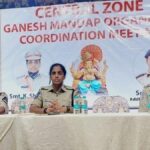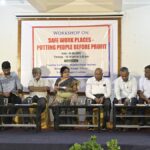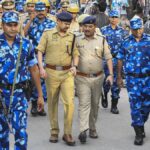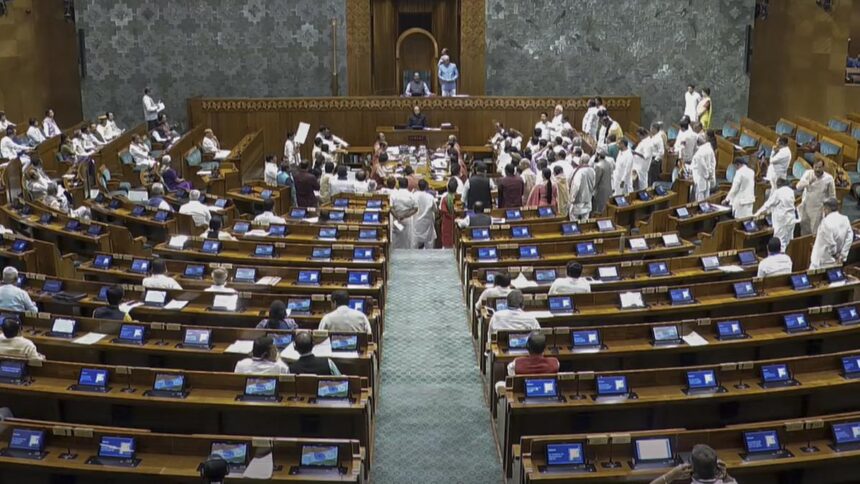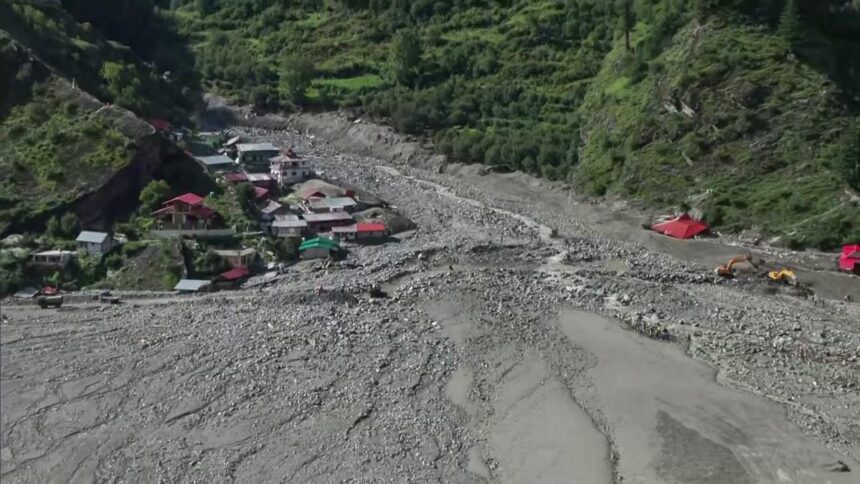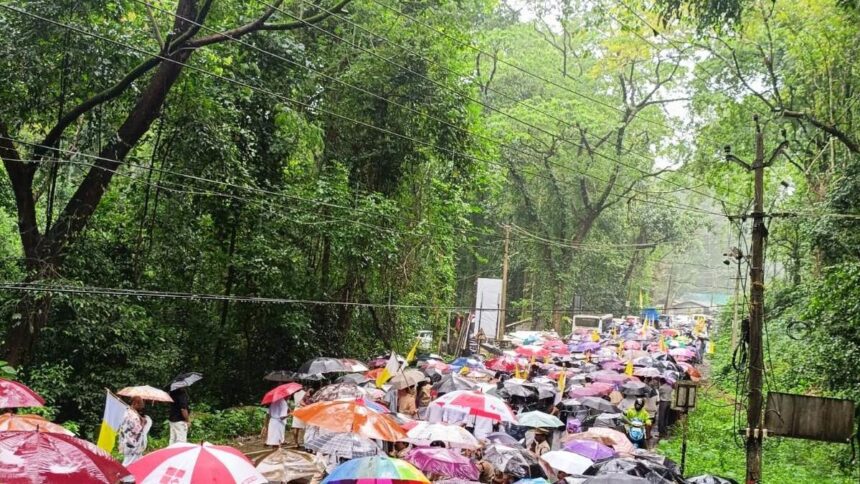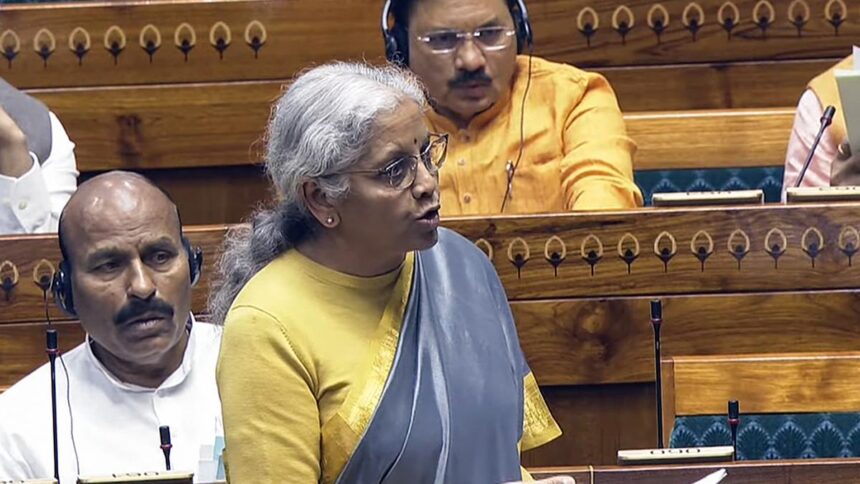It is not yet noon, but the tracks at the Jogbani railway station are shimmering in the heat. Jogbani in Bihar’s Araria district is the last station on the Indian side. The Indo-Nepal border is just a few metres away. Across the railway line, in the cram-jam of run-down semi-urbanisation, the stench from the black refuse gurgling in the open drain overwhelms. The drain runs along a narrow, uneven brick street, down which women and men hurry. They are on their way to meet the booth-level officer (BLO), who sits in a home with the largest courtyard. He has brought enumeration forms issued by the Election Commission of India (ECI) for the Special Intensive Revision (SIR) of electoral rolls.
On June 24, the ECI announced the SIR in Bihar. There are 7.90 crore electors in the State, all of whom must fill in the enumeration forms if they want their name on the electoral rolls. The Assembly election is due in the last quarter of 2025. All enumeration forms must be submitted by July 25. The exercise, however, is primarily aimed at those whose names were not recorded in the 2003 electoral rolls, the last time that an intensive revision of the voter list was carried out in the State. An estimated 2.93 crore people fall into this category.
At Jogbani, as people line up in front of Ijaz Ashraf (name changed to protect privacy), the BLO assigned to their ward, the anxiety is about documents. They have questions. In the crowd of over a dozen, only one person has a matriculation certificate, one of the 11 documents that the ECI has listed as proof of identity and place of birth for the SIR. Others have only ration cards, Aadhaar cards, or election photo identity card (EPIC) or voter ID cards, government documents that are so far not listed by the poll body.

A Bench of the Supreme Court is currently hearing at least 10 petitions filed by Opposition leaders, activists, and non-profit organisations challenging the SIR. The Supreme Court has asked the ECI to consider including these documents that are widely available with people.
Academics and activists say a majority of Bihar’s population does not possess any of the 11 documents. Many face possible disenfranchisement. They argue that updated electoral rolls were published in January 2025 under the Special Summary Revision. The rush has caused confusion among the electorate and put stress on the governance system, they say. Many are calling it “votebandi after notebandi”, the 2016 demonetisation drive that caused similar chaos.
An electorate, anxious and panicked
Ashraf tells people that they only need to show their Aadhaar cards and fill in the enumeration form. The panic eases. “We got a message on June 5 from the block-level authorities that no documents are needed. We were told to look at the Aadhaar cards of people and fill in the forms,” he says. Ashraf is a Shiksha Sahayak, a post created in the 2000s by the then Nitish Kumar government to address teacher shortages in primary and middle schools. Kumar is still in power in Bihar. These positions are mostly on contract basis. Many BLOs say they got oral instructions between July 5 and 8 to fill the form just on the basis of the EPIC and Aadhaar cards.

Ashraf’s phone rings endlessly, with residents asking for directions to his location. There is no house-to-house verification taking place that the ECI had said there would be. As of July 8, he had filled only 40-50% of the over 1,000 forms due from the area he covers. He must get at least 90% of the work done over the next two days. “I have been told that my salary will be withheld if I don’t meet the target,” he says.

The ECI said the SRI was needed because of “rapid urbanisation, frequent migration, young citizens becoming eligible to vote, non-reporting of deaths, and inclusion of the names of foreign illegal immigrants”. The poll body’s aim was to ensure “all eligible citizens are included” and no “ineligible voter is included” in the rolls.
Over the next few minutes, almost seamlessly, electors are handed over enumeration forms, which they take to the two ASHA (accredited social health activists) workers sitting at a table next to Ashraf’s to get them filled. Once the details are filled in, people sign or put a thumbprint on their forms. The process is over in less than five minutes. No documents are attached; no difficult questions are asked, given that several women here were born in Nepal and married men across the border. Some have brought new passport-size photographs; these too are not taken.
On July 6, the office of the Bihar Chief Electoral Officer published an advertisement on the front pages of newspapers in Patna. “Yadi avyashak dastavez tatha photo uplabdh nahi ho, to sirf ganana prapatra bhar kar BLO ko uplabdh karaa de (If you do not have the necessary documents, then just submit the enumeration forms to the BLOs),” it had stated. Later that day, the ECI issued a clarification that there was no change in the instructions to carry out the SIR.

Bihar Chief Electoral Officer Vinod Singh Gunjiyal says, “Go through the orders please. There is no change in orders of the commission.”
The ECI order of June 24 allows those who cannot produce the necessary documents now to submit them during the “claims and objections” period between August 1 and September 1.
The fact that the documents are still needed and the requirement has only been delayed is yet to percolate to the electors.
At Jogbani, 26-year-old Alam Mohammad Raza fishes out his smartphone to show everyone a news clipping from a leading Hindi newspaper on ECI’s “no change” clarification. But the relief of not having to supply the documents is stronger than the doubt. The fear that many migrant workers will be left out of the voter list has also been dulled for now as many BLOs are allowing wives and fathers to sign the enumeration form on their behalf.

Raza must produce proof of date and/or place of birth of himself and one parent, since he was born between July 1, 1987 and December 2, 2004. Those born after December 2, 2004 must produce documents that show proof of date and/or place of birth of themselves and both parents.
The reactions to the SIR vary. For each, the significance of having their name on the electoral roll varies. For some, it is about the right to choose their representative; for many, it is about access to government schemes and subsidies; for the minority, it is the fear that if their names are struck off, they will no longer be deemed citizens and sent to detention camps.
At Jogbani, Imtiaz Ansari, 58, who runs a readymade clothing shop, says he spent two days turning his house upside down looking for the school leaving certificate that shows he completed Class 10 in 1982. He hasn’t needed it in a while. “Didn’t we vote just last year [in the Lok Sabha election]? Didn’t we elect this government? Now the very people whom we elected and placed in the high office are probing us, asking whether we are citizens of this country or not.”
Ansari’s anger pours out in a jumble of questions. “I didn’t come from America or Hong Kong. My grandfather died here, my father is buried here, and I too shall be,” he says.
Those born before July 1, 1987 must show a document with proof of date and/or place of birth. These documents must be attached to the enumeration forms. At least five of the 11 documents listed by the ECI do not indicate the applicants’ place or date of birth.
BLOs, overworked and frustrated
The filing of enumeration forms has gathered pace over the last few days. As per press statements issued by the ECI, on July 5, only 13.19% of nearly 7.9 crore electors filled and returned their forms. This figure has been steadily growing. By July 9, it was at 57.48%. The ECI has not revealed how many of these forms have documents attached to them.
A van spreading awareness of the ECI’s Special Intensive Revision of electoral rolls in Bihar’s Purnia district.
| Photo Credit:
Shashi Shekar Kashyap
There is a narrative that repeats itself across the districts that The Hindu visited. At Kamalpur, on the outskirts of Purnia district, BLO Ramesh Sahu (name changed) says before the advertisement appeared asking people to submit forms without documents, only 50 forms were filled over two days because no one could produce the necessary documents.

Diligently rifling through the documents of the restive people surrounding him, Sahu’s anxiety is peaking. He throws his hands up in frustration. He says he got the enumeration papers only on July 5 at 2 p.m. There are almost 900 electors in the booth under him.
“For the first three days, I could manage to process only 25 forms per day, since we needed to attach the documents. On June 7, I was told I need not ask for those documents; I could get the forms filled just on the basis of an Aadhaar card. Now each day, I am managing to process 50 to 60 forms,” he says. But the pressure is high. Every day he gets three or four calls from his supervisor. “They say they will withhold my salary and seek a written explanation if I don’t finish the task quickly,” he says.
The entire State administration has been deployed to carry out this exercise. There are 98,498 BLOs at work, assisted by ASHA workers. With patchy Internet coverage, the work of uploading the forms is happening at the block office, where the BLO sends in the signed forms.
Hurrying through the enumeration forms without the documents pushes the onus of verification on to the Electoral Registration Officer. “When the draft electoral rolls are made public on August 1, thousands and thousands of names will be missing. My apprehension is that many won’t read the draft rolls too, considering they are working far away from home. It is only when they return home on election day to cast their vote that they will find themselves out of the rolls,” says Jagdeep S. Chhokar, founder of the Association for Democratic Reforms, a non-profit working on electoral and political reforms.
Dalits, angry and worried
At 2.30 p.m. in Jalalgarh, on the outskirts of Purnia district, paddy saplings are being planted by women in fields with shin-high water. A clutch of women takes a break from bending over through the day. They have just finished lunch and are sitting on their haunches.

The government’s insistence on documents has the group riled up. “There is a rate list for each document. An Aadhaar card costs ₹200 per person; a birth certificate anything between ₹1,000 and ₹2,000, depending on whether our children were born in hospital or at home. It also means leaving work for that day to chase after these,” Puja Devi, who is in her early 20s, says of the bribes she must pay through the system. She is a Mahadalit belonging to the Rishidev community, one of 20 Scheduled Castes that are the most marginalised of the Dalit group. The category was created by the Bihar government during Kumar’s earlier term as Chief Minister in 2007.
Everyone chips in with their travails. Rambha Devi, the eldest in the group, well into her 60s, intervenes. “I have this big pile of documents,” she gesticulates. “When they come asking for votes, I will slam it in their faces.” Her bluster invites guffaws from the group. How would their daily lives be affected if they are not on the voting list? The answer is unanimous: they will lose all benefits from both Central and State government schemes. “It is as good as being dead,” says Parvati Devi, in her 30s, speaking the sobering truth.
Naveen Kumar, 33, at Thariya Bakiya village in Supaul town, in a district of the same name, is from the Rishidev community. “This looks like the government wants to drive us out. Isn’t this NRC (National Register of Citizens)? Aren’t they asking for the same documents that people would need for NRC?” he says.
Naveen is a graduate, the only one in his village to have been to college. “I have every document that the government needs. But at least 50% of people won’t,” he says. He is annoyed at the government for sending everyone into this document-hunting spree. As per Bihar’s 2022 caste survey, only 14.71% of adults in the State have completed Class 10.
At Kamlapur in Saran district, Mohammad Mazhar, 28, says he has been trying to make sense of the ECI’s order. His worry is that though he has the school leaving certificate, the elderly at home do not. The worry is further accentuated by the speculation that failure to produce proof of birth and place could lead to not only disenfranchisement but also deportation.
“If the existing electoral roll was good enough to elect the country’s Prime Minister, why is it not good enough to pick the Chief Minister? If the existing voter list is unreliable, let the Prime Minister resign,” he says, angrily.
Dilip Kumar Yadav, a private school teacher in Phulparas, Madhubani district, has stopped at a wayside stall in the main chowk for his evening cup of tea. As the conversation veers towards SIR, he declares, “I will not get all this done. I am working towards getting citizenship of a different country. I don’t want to stay in Bihar.” The group around him laughs. “One man rules this State for 20 years, but does nothing. I have voted for the BJP twice. What have we got in return?” he says.
In the Bihar Assembly, of the 243 seats, the BJP has 79 and the Janata Dal (United), which is part of the National Democratic Alliance at both the Centre and in the State, has 45.
sobhanak.nair@thehindu.co.in
Edited by Sunalini Mathew






